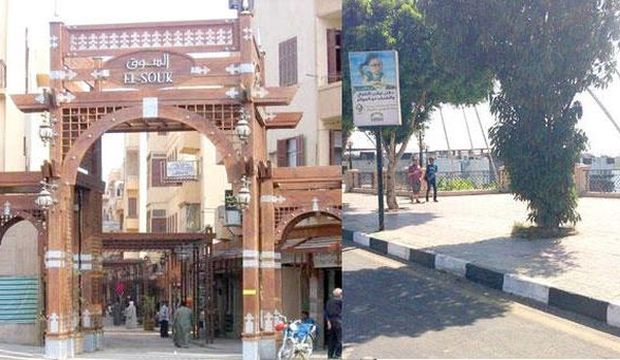
This undated file photo shows the Corniche (R) and tourist market (L) in the Egyptian tourist city of Luxor, both empty of visitors. (Asharq Al-Awsat)
Aswan and Luxor, Asharq Al-Awsat—”The bookings for September have been cancelled . . . We’ve had phone calls telling us not to return to our hotels, despite being optimistic for the recovery of tourism for this year’s season,” said Hussam, a staff member at a renowned tourist company in the Egyptian city of Aswan. “First there was security chaos, now we suffer from electricity blackouts. A Western tourist can’t stay here without air conditioning,” he added.
Hussam’s situation reflects that of hundreds of tour guides and thousands of residents of the nearby city of Luxor, an important tourist destination containing one third of the world’s ancient artifacts and more than 800 archeological sites. Tourism, the main source of employment in parts of many Arab countries, has been paralyzed in Luxor, leading to the departure of many of the younger generation.
The Egyptian authorities have made strenuous efforts to rebuild the tourism industry in Luxor and Aswan, but have faced serious obstacles. The two cities suffered setbacks after the removal of President Hosni Mubarak in 2011 and President Mohamed Mursi in 2013, when protestors damaged power plants, and in mid-August staged demonstrations during which they burned buildings and travel agencies on the Nile Corniche in Cairo to commemorate the first anniversary of the Egyptian police raid on the Muslim Brotherhood’s two sit-ins in Rabaa Al-Adawiya Square and Al-Nahda Square in Cairo.
Local authorities say they are “maintaining control of the security in the two cities in a bid to revive tourism,” adding that “the tourist market in Aswan and Luxor will see a good turnout in the coming season.”
Aswan governor Mostafa Yousry told Asharq Al-Awsat: “The governorate is in a race against time to restore the civilized face of its world-famous cities . . . it has several festivals and international conferences lined up, all aiming at sending a message to the world that Egypt is peaceful and secure.” He added: “Aswan enjoys unique tourism variety. One can visit archeological and religious sites, as well as go on safari and enjoy nature reserves.”
Hussam was less upbeat. “Several tourist companies cancelled their bookings because of the poor visitor turnout as a result of continued electricity failures, despite an increase in bookings compared to last year,” he said, adding that “continuous electricity cuts have led tourists to demanding a full refund for their trip.”
Yehya Al-Sayed, a tourism expert in Aswan, was equally pessimistic. “Tourism in Egypt declined by 80 percent as a result of electricity failures, and the situation was even worse in Luxor and Aswan,” he said.
Asharq Al-Awsat visited Luxor and Aswan to witness the impact of the slump on the two cities that were once key destinations for tourists from around the world. During the past three years, the two cities have been gripped by anticipation and apprehension, something that has caused the security situation to deteriorate further, leaving thousands of workers in the tourism sector struggling to make ends meet.
One Aswan resident told Asharq Al-Awsat: “Now, electricity failures are the major cause of the crisis. For the previous three years security unrest was at the forefront of the crises.”
“Electricity failures give tourists a bad impression about the situation in the country . . . When tourists hear that the electricity has been cut off for over 10 hours in Upper Egypt, they change their travel plans,” he added.
Mohamed Fat’hi, a young man from Aswan, said the decline in tourism over the past three years had led to him being laid off from his job at a company offering Nile cruises, after having spent 15 years in the industry.
“I support a family of five members. I rejoiced when I heard that tourist bookings had increased again and my colleagues told me I could return to work. But my happiness didn’t last long . . . My colleagues told me that the situation remained as it was,” he said.
Today, bookings in tourist hotels in Aswan and Luxor remain low, and the number of tourists there is limited. In response, local tourism authorities are attempting to attract a broader cross-section of visitors, highlighting opportunities for safaris and hunting trips, as well as the archeological and religious heritage of the area, together with promoting arts and handicrafts in the two cities and making efforts to lure festivals and conferences to the area.
An official source at the Egyptian Tourism Federation said: “The revenues generated by tourist hotels and resorts declined dramatically as a result of electricity failures for long periods in the past few days, causing an increase in costs [to businesses] in operations and maintenance, as well as spoiled food.”
“Electricity failures caused most vital electric machines in the hotel to break down, increasing their maintenance cost by 25 percent, let alone making the customers angry,” he added.
The problem has been compounded by tourism-related businesses facing difficulties in paying their bills. According to the Egyptian Electricity Distribution Corporation, businesses in Luxor and Aswan were in debt to the company to the tune of 49.6 million Egyptian pounds (7 million US dollars) up until December of 2013 alone.
An official from the Ministry of Tourism’s office in Luxor said the electricity cuts had “led to the lowest tourism numbers seen in Luxor,” adding that occupancy rates in the city were currently oscillating between 6 and 12 percent, and that 250,000 local youth had lost jobs at places like hotels and Nile cruise ships. Meanwhile, in Aswan, another official tourism source relayed a similarly dire picture, saying that the number of tourists in the entire Aswan governorate could “be counted on one hand.” If the slump in visitor numbers continues, the problem is only going to get worse.
